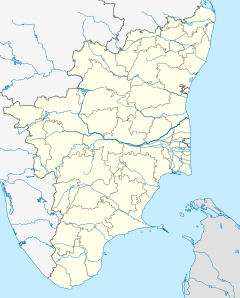Sakthivanesvara Temple (சக்திவனேஸ்வரர் கோயில்)[1] is a temple dedicated to the Hindu god Shiva located in a small village called Thirusakthimutram, near another small (but relatively better-known) village, Patteswaram. The nearest urban centre, about seven kilometres (four-and-a-half miles) away, is Kumbakonam in the Indian state of Tamil Nadu. Here the presiding deity Sakthivanesvara is a form of the Hindu god Shiva, in which his usual worship symbol the Lingam is hugged by his consort Parvati, hence he is also known as Sivakozhundeesvara and Sakthi Mutham. It is believed that when one prays to Sakthivanesvara with faith, one is blessed with the life partner of one's choice.
| Satthi Muttram Temple | |
|---|---|
 | |
| Religion | |
| Affiliation | Hinduism |
| District | Tanjore |
| Deity | Sakthivanesvara (Shiva) |
| Location | |
| Location | Patteswaram |
| State | Tamil Nadu |
| Country | India |
Location in Tamil Nadu | |
| Geographic coordinates | 10°55′36″N 79°20′37″E / 10.92667°N 79.34361°E |
| Architecture | |
| Type | Dravidian architecture |

Significance
editIt is one of the shrines of the 275 Paadal Petra Sthalams - Shiva Sthalams glorified in the early medieval Tevaram poems by Tamil Saivite Nayanar Tirugnanasambandar and Thirunavukkarasar. The temple is counted as one of the temples built on the banks of River Kaveri. It is located on the banks of Kudamurutti, a tributary of river Kaveri.[2]
Legend
editParvathi was doing penance at this place to seek the hands of Shiva. Shiva is believed to have appeared as a column of fire and Parvathi could not bear the heat, she embraced Shiva, give the name Sakthimutram (meaning, Sakthi (Parvathi) embracing Shiva).[3]
References
edit- ^ ta:திருச்சத்தி முற்றம் சிவக்கொழுந்தீசர் கோயில்
- ^ Ka. Vi., Kannan (2019). River cauvery the most battl(r)ed. Notion Press. p. 32. ISBN 9781684666041.
- ^ V., Meena (1974). Temples in South India (1st ed.). Kanniyakumari: Harikumar Arts. p. 27.
